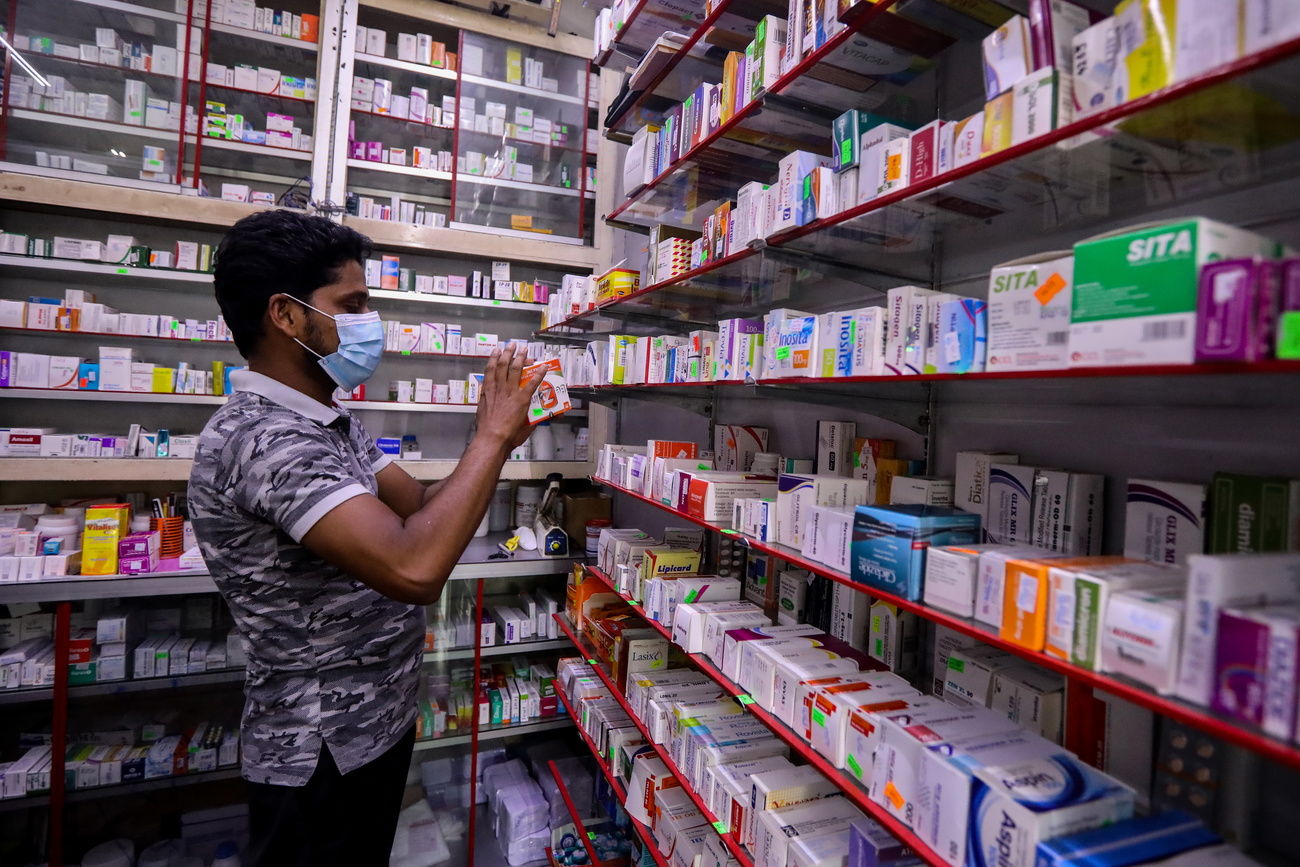
Looming bacterial pandemic triggers debate over how to pay for new antibiotics

Few big pharmaceutical companies are willing to take a stake in the development of much-needed new antibiotics. This means decades of promising biomedical research may never see the light of day. Financial incentives are one solution, but they are controversial.
Public health experts paint a grim picture of a world without new antibiotics. Overuse and misuse of antibiotics has led bacteria to develop defences, leaving once-curable diseases like tuberculosis and gonorrhoea with few treatment options. Some 1.27 million people died from antibiotic-resistant infections in 2019 according to a study published in NatureExternal link magazine in January, far exceeding deaths from high-profile diseases such as HIV/AIDS or malaria.
By 2050, resistance to antibiotics could kill 10 million people a year by one estimateExternal link. For perspective, some 6.2 million have died of Covid-19 in the two years since the pandemic erupted.
“There’s an increasing innovation gap between the tools that we need to fight antimicrobial resistance and the tools that we have available,” John Young, global head of pharma research and early development in infectious diseases at biotech group Roche, told SWI swissinfo.ch. “Some companies working in this space have faced severe financial challenges. In some cases, they’ve gone bankrupt because there is no viable market.”
Basel-based Roche was a major player in antibiotics for decades, developing best-selling products such as Bactrim and Rocephin, but withdrew from the market in 1999 only to return in 2013. The U-turn was prompted partly by a dramatic increase in bacteria that are highly resistant to traditional antibiotics, Young says. The company and its subsidiary in the US currently have two antibiotic candidates in the clinical stage and are also working on digital and diagnostics solutions to “find the right drug for the right bug at the right time”.
Roche is one of the few big pharmaceutical companies carrying out its own antibiotics research — most other heavyweights, including Novartis, Sanofi and AstraZeneca pulled out over the last decade. Most innovative research in the field is now done by small companies that don’t have the experience or the resources to take novel discoveries from lab to patient.
The dwindling number of new antibiotics has left global public health officials in a desperate situation. To prevent a simmering health crisis from developing into a full-blown pandemic, they need pharmaceutical companies to develop and commercialise new antibiotics. But the economics aren’t compelling for the pharma giants, so getting them on board may require taking what many in public health see as an unpalatable option – offering financial incentives to an already highly profitable industry.

More
Pandemic rattles already vulnerable antibiotics market
The economic dilemma
Roche’s return has injected optimism into antibiotics research and could be a boon for Switzerland’s position in the field. Basel alone hosts 18 university-based research groupsExternal link working on antimicrobial resistance as well as collaborative ventures like NCCR AntiResist (National Centres of Competence in Research), which received CHF17 million ($17.7 million) from the government-backed Swiss National Science Foundation to discover new approaches to antibiotics.
But moving this work out of academic halls is challenging. Most projects are funded by grants and when they end, so do the projects. This means promising research may never even get to the clinical trial stage, let alone to patients.
Only 14 new antibiotics have been approved by US or European authorities since 2014. Out of these, just three are considered “novel”, which means they have a new chemical structure or a new mode of action. The rest are derivatives of existing antibiotics, many developed 30 years ago, that are increasingly ineffective. Bacterial resistance to one antibiotic often leads to resistance to similar types of antibiotics, which is why novel antibiotics are so important.
There are huge risks and costs involved in developing a novel antibiotic – some 95% are said to fail in clinical trials and sales are usually insufficient to recoup the required investment. One 2017 estimateExternal link put the cost of developing a drug at around $1.5 billion, while industry analysts say it might generate roughly $46 million per year in sales.
The tale of Swiss firm Polyphor illustrates the risks. Set up in 1996, the company was developing an antibiotic to fight Gram-negative bacteria, which is known to cause severe pneumonia and is highly resistant to antibiotics. It raised $87.5 million in eight rounds of funding, had a licensing deal with Roche, and was the largest biotech IPOExternal link on the SIX Exchange in spring 2018. A year later, Polyphor halted pneumonia trialsExternal link of its antibiotic candidate murepavadin due to safety concerns, causing its stock price to plummet. The company eventually merged with another biotech firm in 2021.
Big pharmaceutical companies are willing to take on the risk when it comes to developing cancer drugs because the financial rewards are so large. But the economic incentives aren’t there for antibiotics, which are often compared to fire engines when there’s no fire. They just sit idle, waiting to be used in an emergency.
Antibiotic companies can’t depend on volume sales, as many vaccine makers do, and the conventional wisdom is that the drugs must be affordable. Although drug resistance is a global problem, lower-income countries are most affected, which makes price an important factor.
“There is a clear high unmet need but it’s really difficult to generate a decent return on R&D investment when treatments are only used, for example, for a five- to 30-day cycle and (doctors) don’t want to prescribe pricey antibiotics when cheaper generics are available,” Thomas Heimann from the venture and growth capital firm HBM Healthcare Investments told SWI swissinfo.ch. The firm stopped investing in antibiotics companies a decade ago.
Building the pipeline
The poor returns for investors have created a self-reinforcing downward spiral: the fewer venture capitalists and big pharma companies there are willing to invest in antibiotics research, the fewer promising candidates there are to invest in.
“The whole antibiotic pipeline needs to be re-invigorated,” says Douglas Häggström, who manages INCATE, the Incubator for Antibacterial Therapies in Europe, hosted at the University of Basel. The incubator, which was set up last year and counts Roche among its four corporate sponsors, is trying to fix the problem by helping early-stage research become ready for the next funding stage. It is selecting 2-4 antibiotic start-ups every quarter to receive business support as well as a €10,000 grant to develop their ideas.
Of those, a handful will receive funding of up to €250,000 per venture. By 2023, INCATE aims to have backed 50 ventures. Other non-profit financing vehicles such as the US government-backed CARBX are also trying to accelerate innovation in the field.
“If there are only four companies to invest in, then that’s not an industry to go into but if there are 50 to choose from, then it becomes interesting as a venture capitalist or a pharmaceutical company to come in,” said Häggström. “Our goal is to make the whole process more efficient.”
Inching closer
While this kind of catalytic investment should help “grease the wheels”, as Häggström puts it, there’s a lot more that needs to happen. Many hopes are riding on the AMR Action Fund, launched during the height of the Covid-19 pandemic with a $1 billion war chest to bring two to four new antibiotics to market by 2030. The fund, which has its European headquarters in Basel, is backed by the 20 largest pharmaceutical companies. On April 4, the fund announced its first investments into two start-ups who have antibiotics in clinical trials.

More
Can big pharma’s money solve the antibiotics crisis?
But despite all these efforts, small companies, even those that manage to launch a product, are still struggling to stay afloat. There are growing calls for deep-pocketed pharmaceutical heavyweights to get involved to guarantee that all the investment in innovation doesn’t go to waste.
“What we really need to do is bring big companies back to the table,” says Chantal Morel, a health economist at the University of Geneva who has been working in the antibiotics field for more than a decade. “The only way you do this is by giving them a clear incentive.”
Stirring controversy
The problem, however, is to find the right approach. Several ideas have been floated over the years to bring big players on board in a way that delinks financial incentives from volume sales. “Pay to PlayExternal link”, a model first touted in 2016, would require companies to pay a surcharge if they decide not to invest in research and development, but it was quickly quashed by the industry.
On April 12, the United Kingdom announced the world’s first subscription antibiotics schemeExternal link, where the National Health Service pays companies a set amount upfront for effective antibiotics rather than reimbursing them based on the quantity sold. The pilot scheme will offer US firm Pfizer and Japanese firm Shionogi contracts capped at £10 million a year each, to supply a new antibiotic for up to ten years. Time will tell if this is enough to keep big companies in the market.
The pilot took six years to take shape, which some experts say is too slow. As the urgency grows, the industry is now backing a controversial proposal for what’s known as a transferable exclusivity extension. This would allow companies who bring innovative antibiotics to market to get a voucher to extend their monopoly on a higher-priced medicine in their portfolio such as a patented cancer treatment. The voucher could also be sold to another company.
Industry lobbyists argue this is a faster and more politically feasible way forward. But the proposal would mean patients, and more specifically insurers and health systems, paying more for medicines because they will have to wait longer to obtain cheaper generic versions of some blockbuster drugs. Such a proposal could create windfall profits for some pharmaceutical companies – one studyExternal link found that the value of a one-year extension for a drug with $1 billion in total revenue would lead to an additional $250 million to the drugmaker.
So far, no country has backed the proposal but some public health advocates who have been sceptical of the idea are starting to come round out of sheer desperation. “The idea seems ridiculous in many ways. There is a lot of reluctance to hand over money to a sector that is already lucrative,” says Morel. “But we’ve been talking about the problem [of antimicrobial resistance] for years and there’s been so little action. Covid-19 has showed the small price of incentives compared to the cost of a pandemic.”
Even if this solution gets taken up, terms and conditions including the time limit of an extension need to be clear and companies should be required to monitor resistance to the antibiotic over time, Morel says.
Public health experts interviewed by SWI say they’d prefer to see an overhaul of the pharma model and see a change in mindset whereby society values antibiotics for their life-saving benefits. But the race to find novel antibiotics before a global crisis really takes hold has made them increasingly impatient.
“Such an incentive may be a necessary evil to reboot the system,” says Jean-Pierre Paccaud from GARDP, a non-profit organisation based in Geneva developing antibiotics that address global health needs. “I’m not convinced this is sustainable, but we don’t have a better solution right now.”
Edited by Nerys Avery

In compliance with the JTI standards
More: SWI swissinfo.ch certified by the Journalism Trust Initiative






























You can find an overview of ongoing debates with our journalists here . Please join us!
If you want to start a conversation about a topic raised in this article or want to report factual errors, email us at english@swissinfo.ch.